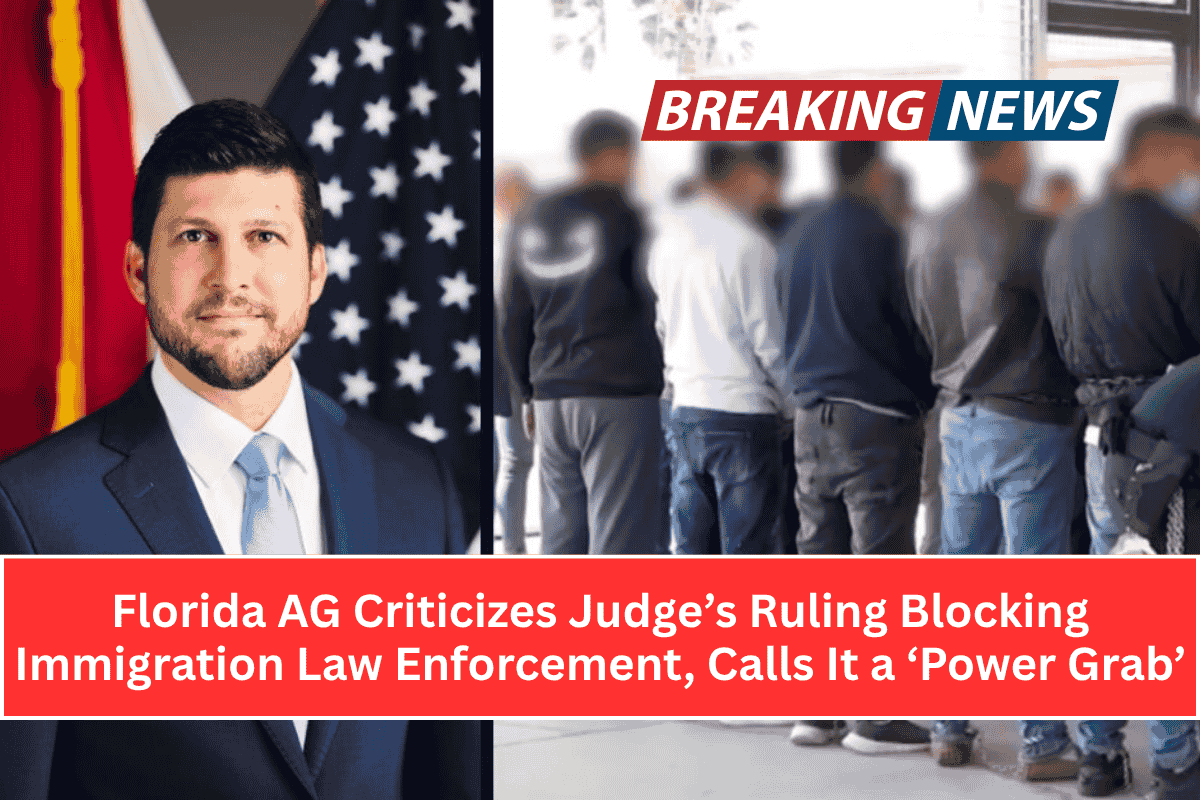Florida Attorney General James Uthmeier has aggressively pushed back against a federal judge’s order blocking the enforcement of the state’s new immigration law, SB 4-C, calling it a “remarkable power grab.”
The law, signed by Governor Ron DeSantis in February, criminalizes the presence of immigrants who have entered the U.S. illegally, leading to significant legal battles and disputes over state versus federal authority on immigration matters.
Background on the Dispute
In April 2023, U.S. District Judge Kathleen Williams, an Obama appointee, issued a 14-day stay and later a preliminary injunction, blocking SB 4-C from being enforced. Williams reasoned that immigration enforcement is primarily the responsibility of the federal government, not individual states.
Her injunction followed the signing of the law by Governor DeSantis and has sparked ongoing controversy regarding whether states should have more control over immigration regulation.
Uthmeier and the Florida government argue that the law is necessary to address the ongoing challenges posed by illegal immigration and that Florida must have the power to combat the “evil effects of illegal immigration” within its borders. According to Uthmeier, the inability to implement SB 4-C has left the state exposed and vulnerable.
The Legal Clash
In response to Uthmeier’s request for the U.S. Supreme Court to intervene, immigration advocacy groups, including the Florida Immigrant Coalition and the Farmworker Association of Florida, filed a brief urging the Court to uphold the judge’s injunction temporarily.
They argue that the law conflicts with federal immigration regulations, which they claim have already established a comprehensive framework for dealing with unlawful entry into the U.S.
Uthmeier’s reply, filed on July 7, criticizes these advocacy groups for downplaying the national crisis of illegal immigration.
He contends that the plaintiffs and the district court are ignoring the realities on the ground, particularly the challenges faced by states like Florida, which he says has a right to protect its residents and implement measures like SB 4-C.
The Legal and Political Implications
Uthmeier’s filing criticizes the federal judge’s injunction, calling it a “remarkable power grab,” claiming that the injunction oversteps the authority of the courts by imposing a broad restriction on Florida’s law enforcement officers, even those not named in the case.
According to Uthmeier, the decision gives a single federal judge power to control state officials, which undermines the separation of powers under Florida’s constitution, where executive powers are shared among various officials, including the attorney general, county sheriffs, and municipal police chiefs.
Uthmeier also argues that the injunction irreparably harms Florida by preventing the state from enforcing a law that he believes falls under the state’s police power, designed to protect the safety and well-being of its residents.
What’s at Stake?
The SB 4-C law, while controversial, aims to address what Florida officials describe as the “calamitous effects” of illegal immigration on the state’s communities.
With the injunction in place, Florida has been unable to enforce the law, which Uthmeier claims exacerbates the challenges of illegal immigration and harms Florida’s residents both physically and financially.
The Supreme Court has yet to decide whether it will take up the case, but the outcome will likely set a precedent for the balance of power between state and federal governments on immigration enforcement.
Advocates for immigration rights fear the law could lead to increased deportations and harm to immigrant communities, while supporters argue that states must be empowered to protect their residents from the consequences of unlawful immigration.
What’s Next?
Florida’s legal team continues to push for the Supreme Court to allow the state to enforce SB 4-C, with Uthmeier calling the delay an “unjustified” harm. The case could be significant in shaping future state-level immigration laws and the role of the federal government in enforcing immigration policy.






